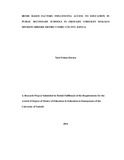| dc.description.abstract | The purpose of the study was to investigate home based factors influencing access to
education in public secondary schools in drought stricken Siakago Division Mbeere
District Embu County, Kenya. The study was guided by four research objectives, to
establish the extent to which parental level of education affects access to education in
public secondary schools in drought stricken, to establish the influence of household size
on student access to education in public secondary schools in drought stricken, to assess
the extent to which food security factors affects students access to education in drought
stricken and to assess the extent to which students’ involvement in household economic
activities affects their access to education in drought stricken Siakago Division, Mbeere
District, Embu County. The study adopted descriptive survey design. The target
population comprised of all the 24 public secondary schools in Siakago division. The
schools had a total number of 281 teachers and 700 form three students. From the 8
schools all the 8 headteachers, 90 teachers and 238 students were selected for the study.
Findings on the effects of parental level of education to access to education revealed that
parents level of education was a factor that affected low access to education in the school
as indicated by majority 6(85.7%) of principals and majority 47(55.3%) of teachers.
Findings also revealed that household size was a factor affecting students’ access to
education in their school. Findings also showed that inadequate food during drought
contributed to inability of students to access to education. It was also revealed that
students’ involvement in household economic activities affected their access to education
as was revealed by majority 5(71.4%) of principals. Based on the study findings, the
study concluded that parental level of education was a factor that affected students’
access to education in drought stricken Siakago Division, Mbeere District. The study also
concluded that access to education was affected by the household size. Families with
large number of children were not able to support them educationally hence some
children missed out education opportunities. The study concluded that lack or inadequate
food during drought was a factor that affected access to education among students in
drought stricken Siakago Division, Mbeere District. Students were therefore not able to
access education due to hunger. It was further concluded that students in drought stricken
Siakago. The study recommended that there is need of all the stakeholders in education,
to sensitize the community and the parents on the importance of education so that they
can encourage their children to attend school. There is need to empower the local
community economically so that they are able to support all children in the family to
access education. The county government, the local NGOs should provide food to the
community during drought so that students do not miss out school due to lack of food.
The national and the county governments to establish possible measures that could be
adopted in an effort to increase access to education in drought stricken areas. The study
suggested that since the study was carried out in one administrative County, there is need
to have a similar study in a larger area and compare the results. | en_US |

